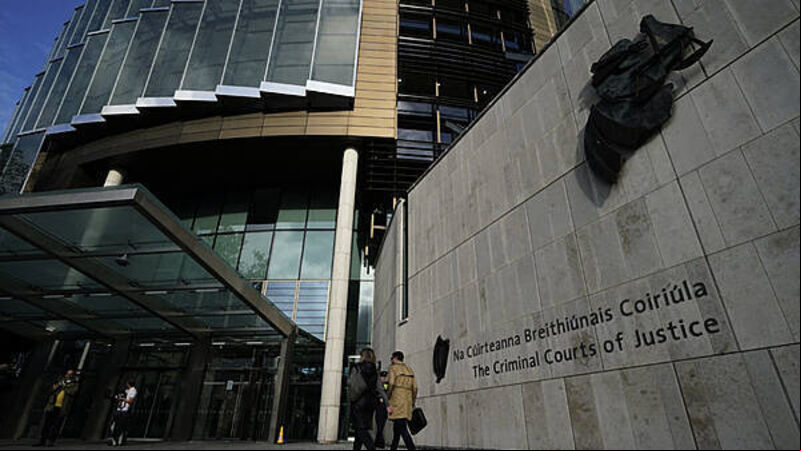DNA profiles matching two men accused of rape found on woman's clothing, court hears

By Eimear Dodd
DNA profiles matching two men accused of the rape and sexual assault of a woman they met at a Dublin nightclub were found on items of clothing, a Central Criminal Court jury has heard.
The three men, aged between 34 and 42, with addresses in Dublin and Wicklow, have pleaded not guilty to a total of seven counts of rape, oral rape and sexual assault of the woman at an unknown location in a car and in a Dublin house on August 31st, 2019.
The men, who cannot be named for legal reasons, deny any wrongdoing.
A forensic examiner gave evidence on Monday that she analysed a sexual offences examination kit and clothing seized from the woman.
She said she analysed saliva samples found on the inside of the woman's bra. She said a mixed DNA profile was identified, including the first man's DNA and the third man's DNA, along with a third trace contribution, which could not be interpreted due to insufficient information.
The witness said an analysis on the woman's underwear found the first accused's DNA and third man's DNA along with a trace contributor.
She outlined that DNA was also found on a number of other samples, but insufficient male DNA was found to create a profile. Seminal fluid was also identified on some swabs.
The witness said the second man was excluded from all interpretable portions of DNA.
She agreed with Padraig Dwyer SC, defending the first man, that it is possible that saliva deposited on the chest could have transferred to the bra's fabric.
She further accepted his proposition that it is possible that the movement of a bra could cause the transfer of saliva from the skin, though she added “my expectation would have been that it was not transferred” due to the area of the bra sampled.
She agreed with Garrett Baker SC, defending the second man, that her analysis did not identify the second man's DNA profile.
The witness accepted a general suggestion by Seamus Clarke SC, defending the third man, that it is possible for a secondary transfer of DNA to occur if two men separately kiss a woman, then one of them performs oral sex on her. She added that other factors would affect the probability of this occurring.
Under re-examination, Karl Finnegan SC, prosecuting, noted that a white top belonging to the complainant was also sent for analysis and asked if she would expect to find DNA if the top was not removed.
She would have a “lower expectation” of finding saliva and DNA in these circumstances, “if the clothing is never removed, that’s unlikely”.
The investigating garda said a phone belonging to the second man was seized following his garda interview in September 2020.
Whatsapp exchanges
He said this phone along with other phones seized from the three men following searches of their homes in December 2020 were analysed, but no further videos were identified.
The witness gave evidence that Whatsapp exchanges between the three men were found, which showed the men arranged to meet the day before their interviews on September 10th, 2020.
He agreed with Mr Baker that the accused men would have become aware of the investigation in December 2019 when searches were carried out at their homes.
The garda agreed he was ed by a solicitor representing the three men shortly after the searches occurred, but rejected Mr Baker's suggestion that there would have been an expectation that garda interviews may have taken place earlier than they occurred in September 2020.
The court also heard evidence from a forensic toxicologist, who analysed blood and urine samples taken from the complainant, around 10 to 12 hours after the alleged incident.
She said her assessment of the most likely blood-alcohol levels were 290mg/100ml at 10 hours, 310mg/100ml at 11 hours and 330mg/100ml at 12 hours.
The toxicologist then outlined the likely blood-alcohol ranges as 200mg/100ml to 350mg/100ml at 10 hours, 210mg/100ml to 375mg/100ml at 11 hours and 220mg/100ml to 400mg/ml at 12 hours.
She outlined the possible general effects of these ranges of alcohol consumption, noting that this will vary from individual to individual.
The witness said the urine sample was analysed to check for 43 different drugs, including the most commonly abused drugs and those associated with alleged drug-facilitated sexual assault. Only cocaine was detected.
In cross-examination, she also told counsel for the three men that everyone is affected by alcohol differently and that factors such as whether a person has had a meal and their level of tiredness can impact on how alcohol may affect them.
She accepted Mr Dwyer's suggestion that a person could have a high level of alcohol in their system and still appear to be functioning normally and that the urine sample analysis can only determine the presence or absence of a drug such as cocaine.
The witness further accepted Mr Clarke's contention that her report states that other evidence, including CCTV, should also be reviewed when considering the effects of alcohol on an individual.
In response to a query from Mr Justice Paul Burns, the forensic toxicologist said it is much more complex to predict how drugs are metabolised by the body.
She said urine analysis is used as it is a longer detection window than blood analysis, but other drugs would have been expected to be detectable within that time range.
The first man, aged 39 with an address in Dublin, has pleaded not guilty to one count of raping the woman in his home address and not (NOT) guilty to one count of oral rape and one count of sexually assaulting her in a car.
The second man, aged 42, with an address in Wicklow, has pleaded not guilty to one count of raping the woman in the car and one count of raping her in the house.
The third man, aged 34 with an address in Dublin, has pleaded not guilty to orally raping the woman in the house and sexually assaulting her in the car.
The prosecution has now rested. The trial continues before Mr Justice Burns and a jury.
If you have been affected by any of the issues raised in this article, you can call the national 24-hour Rape Crisis Helpline at 1800-77 8888, access text service and webchat options at drcc.ie/services/helpline/ or visit Rape Crisis Help.









